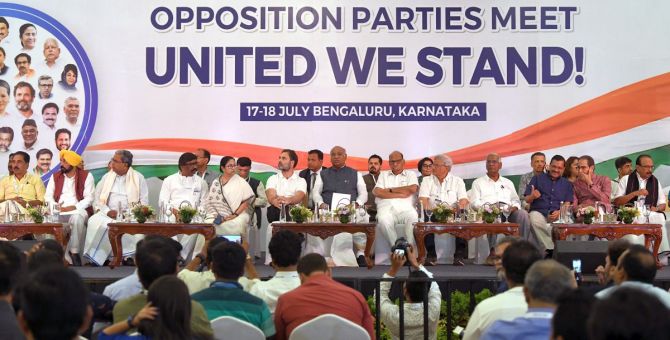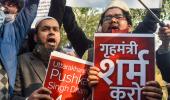'... are losing faith in the institutions of government, where people do not believe that the institutions of government operate according to the Constitution, within the confines of the law, where these institutions are seen to be representing a small faction of a particular community against all other (minority) communities.'

Dr Ajai Sahni, executive director, Institute for Conflict Management and the South Asia Terrorism Portal, is an astute observer of the many challenges that confront India's national security.
"Every community now looks upon the other with suspicion," Dr Sahni tells Prasanna D Zore/Rediff.com in the concluding segment of a two-part interview.
- Part 1 of the Interview: 'Everybody is feeling unsafe, not just the minorities'
If the deterioration in the communal environment continues to decline for another decade or so, what consequences could that have for India?
What is important is the impact it (flaring up of communal intimidation) could have on India's capacities for growth, India's capacities to remain united, and in its efforts to become a developed country.
It is already devastating. India has lost trust across the world and even within the country. Every community now looks upon the other with suspicion. The faith in governance and in governments has completely dissipated.
You cannot run a country where the people are losing faith in the institutions of government, where people do not believe that the institutions of government operate according to the Constitution, within the confines of the law, where these institutions are seen to be representing a small faction of a particular community against all other (minority) communities.
What impact could the communal atmosphere in India have on Indians living in Gulf countries, most of which, predominantly, follow Islamic tenets to govern their people?
The Gulf countries, as it is, treat Hindus very, very, poorly. In fact, they treat all outsiders very badly.
Now, if there is a continuous sense that Muslims are being targeted in India, we can expect over time a hardening reaction in the Gulf countries towards Indian migrants there, and particularly towards non-Muslim Indian migrants there.
However, we may also add that Indian diplomacy has over the past years been able to improve relationships with many Gulf countries. So the Gulf countries have tended to become less critical of Indian policy on considerations of trade, of other elements of relationships, such as diplomatic support in international fora.
For the time being, there is no imminent threat of a particularly harsh response from all the Gulf countries. But eventually this is a possibility and a potential that may be realised if we keep on going down the same path.
What's the way out of the stituation that we find ourselves in right now?
It's an electoral process. They (the followers of Hindutva) have come to power through the electoral process and that is what has created this crisis at the scale at which we now see it.
The only way to improve relationships between the two communities is to first end the efforts to destroy relationships between the two communities.
If you do not end those efforts to destroy the relationships between communities, how are you going to improve relationships? And those efforts (to destroy relationships between the Hindus and Muslims) are being fuelled by the State, its agencies.
The power of the State is behind them. The power of the ruling party is behind these forces at this juncture. So unless there is a shift in the way people vote, there is not going to be any possibility of an improvement in the foreseeable future.
We must also -- when we talk about a shift in the way people vote -- constantly remind ourselves that the BJP's vote share in the national elections at least is 37-38 per cent. That means that 62-63 per cent of the population is not supportive of these ideas. Which means the majority of Hindus are not supportive of these (Hindutvavadis).
That would be 60 per cent to 63 per cent of the voting population...
Yes, of the voting population. Now, there again comes the factor that how many people don't vote, what are their positions? How do you mobilise these people? But the point is that, eventually, the response has to be electoral.
As long as they (Hindutvavadis) are able to win elections by their polarising politics, by their hate politics, there is no solution.

Do you think there is space in India today for the kind of politics that opposes Hindutva politics?
There is more than enough space, but there is no leadership. There is incoherence. I mean, we come back to the same thing.
How do you measure space if 62-63 per cent of the population is voting against the BJP? The space obviously exists. The problem is that that space is not properly being mobilised by credible political leaders.
People have lost faith in the parties that proclaimed secularism because of whatever reasons of corruption, incompetence, failure to stand by the values of secularism.
These (so-called secular) parties that call themselves secular have not acted in secular ways historically. So if I am to choose between one non-secular and another non-secular party, then the whole idea of a religion-based discrimination between Hindutva groups and non-Hindutva groups is ended.
Everyone is communal. If everyone is communal, then communalism becomes a secondary thing I vote for on some other grounds. Or, I vote for the most communal blatantly communal party.
The failure is basically of the Opposition. Not that the voter is overwhelmingly voting for Hindutva parties. That is absolutely not the case.
But you (the Opposition) are not able to mobilise the Hindus or effectively mobilise them. They are voting for you, but you are not able to consolidate that vote because you are fighting among yourselves, because no single party has any surviving credibility.
Those are the problems that are making an effective response to electoral mobilisation to Hindutva fanaticism impossible.











 © 2025
© 2025